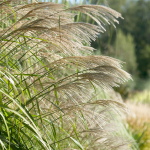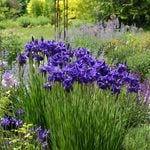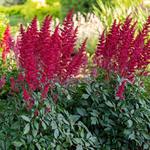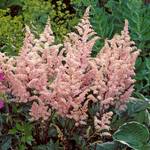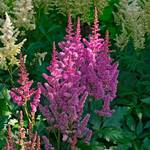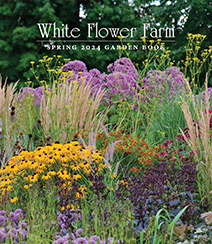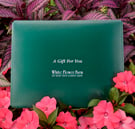Product Details
Silky silver plumes curling on 5′ stems make Miscanthus sinensis 'Gracillimus' one of the most striking and lovely of the Ornamental Grasses. It has fine textured foliage which arches in a vase shape, forming a perfect base for the airy and elegant late summer bloom. On its own or set in contrast to a compact shrub, this longtime favorite brings an impressive presence to the garden.
The genus Miscanthus comprises about 14 species native to parts of Africa, Asia, and the Pacific islands. One well-known species native to East Asia, Miscanthus sinensis, variously called Eulalia Grass, Maiden Grass, Chinese Silver Grass, or Japanese Silver Grass, likes to grow in low areas and at the base of mountains. It is a warm season Grass, meaning it thrives during the hotter months of the year and goes dormant in late fall and winter. Eulalia Grass and its cultivars range in height from 3’ to 10’ tall or more, producing clumps of graceful leaf blades that may be solid, striped, or cross-hatched. From midsummer through fall, stalks of plumed flowers catch the sun beautifully and add interest to the garden when many other plants are starting to fade. With so much to offer ornamentally plus being tough and adaptable, Miscanthus is a popular garden plant whether planted in containers, as hedges, or at the back of the border.
The invasive potential of Miscanthus sinensis has been a concern throughout its century or more of cultivation. With quarantines and restrictions in place in several states around the country, there is debate about whether planting this Grass is environmentally sound. Current research and breeding efforts are pursuing varieties that are 100% sterile or that have an extremely low probability of setting viable seed during their growth cycle. White Flower Farm is dedicated to sourcing cultivars that are as noninvasive as possible.
For more information on growing Ornamental Grasses, click Growing Guide.
Shipping
HOW PLANTS ARE SHIPPED
The size of the plants we ship has been selected to reduce the shock of transplanting. For some, this means a large, bareroot crown. Others cannot travel bareroot or transplant best if grown in containers. We ship these perennials and annuals in 1 pint pots, except as noted. We must point out that many perennials will not bloom the first year after planting, but will the following year, amply rewarding your patience. We ship bulbs as dormant, bare bulbs, sometimes with some wood shavings or moss. Shrubs, Roses, vines, and other woody plants may be shipped bareroot or in pots. The size of the pot is noted in the quick facts for each item.
WHEN WE SHIP
We ship our bulbs and plants at the right time for planting in your area, except as noted, with orders dispatched on a first-come, first-served basis by climate zone. We also ship a wide range of containers and planters, tools, supplies, fertilizers, garden wear, garden decor items, as well as indoor decorations like wreaths and dried bouquets when available. Estimated dates for shipping are indicated in the green Shipping Details box for each item. Please supply a street address for delivery. Kindly contact us with two weeks notice, if you'll be away at the expected time of delivery.
OUR GUARANTEE
We guarantee to ship plants that are in prime condition for growing. If your order is damaged or fails to meet your expectations, we will cheerfully replace or refund it. Please contact our Customer Service Department at 1-800-503-9624 or email us at [email protected]. Please include your order number or customer number when contacting us.
Reviews
Average Customer Rating:
 (2 Reviews)
Write a Review
(2 Reviews)
Write a Review
Sort by:
Update to my previous review 
A viewer from IL
17 of 17 people found this review helpful. Do you? yes no Certified buyer
Disappointed with packing issue 
A viewer from IL
20 of 20 people found this review helpful. Do you? yes no Certified buyer
Growing guide
Most varieties of ornamental grasses grow well in full sun and average garden soil. Keep their foliage for winter effect, cutting back all except the evergreen varieties (Festuca) before new growth emerges in the spring. Refresh Festucas by "raking" out the dried and dead leaves with gloved fingers.
Some species thrive in part shade, or even full shade, expanding the possibilities for Grasses in the garden. Hakonechloa is suitable in part shade, Sesleria in full sun to part shade, and Carex (Sedge) can thrive in full sun to full shade locations, depending on the variety. All need soil that stays evenly moist, although Sesleria can tolerate drier soils, and even drought.
Transplant and divide in spring. Grasses that spread by rhizomes ("run" ) can be invasive and should be divided every year or so. Grasses that grow in clumps die out in the center and need dividing every few years.
Fertilize ornamental grasses in spring with a balanced fertilizer. We don't recommend, however, fertilizing them their first spring to allow the roots enough time to settle in before having to support their very lush top growth.
Ornamental Grasses appear to be quite deer-resistant. Evidently the sharp-edged leaves are unpalatable.
Grasses are at home in mixed borders of perennials, bulbs, and shrubs. Consider summer and fall-blooming perennials as companions: Achillea, Rudbeckia, Helenium, Asters, Monarda, Perovskia, Phlox, and Oriental Lilies. The large Miscanthus varieties work well in the back of a border, or even as single specimens. Because most grasses are sited in the middle or back of a border and are cut back in early spring, we like to plant spring-flowering bulbs around them for color early in the year. Daffodils, Tulips, and Alliums bloom while the Grasses provide little to look at. Then the Grasses and foreground perennials sprout and camouflage the bulbs' maturing foliage.

